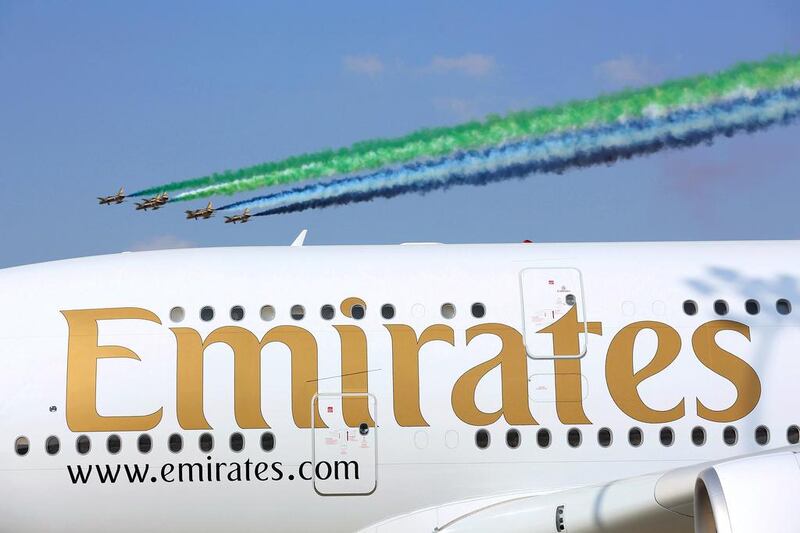Emirates Airline is leading issuers of Islamic bonds back to the market, reviving a year in the throes of its worst start since 2010.
Emirates, the world’s biggest airline by international passenger traffic, plans to sell US$1 billion of Sharia-compliant notes this quarter, two people familiar with the matter say. Petroliam Nasional, the Malaysian state oil company known as Petronas, is seeking to raise as much as $7bn in the largest sale of dollar-denominated sukuk. The Islamic Development Bank will meet investors from this week before a possible issue.
Global sales of Sharia-compliant debt have slumped more than 70 per cent this year amid a plunge in crude prices. The drought underscores the industry's dependence on sales from the GCC, home to a third of the world's proven oil reserves, where borrowers have been delaying offerings, according to Mashreq Capital DIFC.
“Issuers are waiting for the oil price to stabilise,” says Abdul Kadir Hussain, the Dubai-based chief executive of Mashreq, which runs the two best-performing Islamic fixed-income funds in the Middle East and Africa over the past year. “If they came in an environment where the prices are unstable, investors would either demand a higher risk premium or they may not look at the deal.”
About $1.8bn of sukuk have been sold globally this year, compared with $6bn for the same period a year ago, according to data compiled by Bloomberg. Brent crude has risen more than 25 per cent since January 13, after declining by about 50 per cent last year as the fastest US production in three decades helped trigger a global glut and Opec maintained output.
“Activity will pick up markedly over the coming weeks,” says Andy Cairns, the global head of debt origination and distribution at the National Bank of Abu Dhabi, the GCC’s biggest regional bond underwriter in 2014. “We have a strong mandated pipeline, both traditional sukuk issuers and debut names, from the region and outside.”
NBAD is one of the banks mandated to arrange Islamic Development Bank's investor meetings. The Saudi Arabia-based bank, Emirates and Petronas are all established sukuk issuers. Sales in 2014 reached $46.3bn as the market expanded with debut sovereign sukuk sales from the United Kingdom, Luxembourg, Hong Kong and South Africa.
A rebound in sales probably will not be enough to erase the slow start, according to Richard Segal, the head of emerging- market credit strategy at Jefferies International.
“I would be very surprised if we approach last year,” Mr Segal says. “Corporates as a whole, there isn’t that much appetite. They are turning to go to the banks instead of the bond markets.”
Dubai Islamic Bank’s $1 bn Tier 1 sukuk is the only dollar-denominated Islamic bond sold this year, according to data compiled by Bloomberg. For the first time since 2009, there have been no non-financial corporate bond sales at all in the GCC.
“Now we’re seeing some sort of stability, you’re going to start seeing more issuance,” Mr Hussain says. “From what I’m hearing in the market, the pipeline is pretty strong.”
Meanwhile, Indonesia’s state-owned airline plans the nation’s first corporate global sukuk sale to tap dollar wealth in the Middle East and cut funding costs.
Garuda Indonesia, which uses the national symbol of a mythical eagle as its insignia, may issue $500 million of US currency Sharia-compliant debt in April, widening its investor base, says the finance director Askhara Danadiputra in Jakarta. Emerging-market dollar bonds yield an average 6 per cent, compared with 7.1 per cent for rupiah-denominated notes, JP Morgan indexes show.
Garuda will set a precedent for Indonesian companies after the government sold its first international Islamic bonds in 2009. The investment-grade offering may attract buyers in the GCC. The region accounted for 32 per cent of the $46bn total sales last year versus 49 per cent in 2013, reflecting declining crude prices that have benefited airlines.
“The successful outcome of Garuda’s trailblazing effort will hopefully be the catalyst to spur other Indonesian blue chips to ride the momentum,” says Alhami Abdan, the Kuala Lumpur- based head of international finance and capital markets at OCBC Al-Amin Bank.
Mr Danadiputra says the Islamic bond will help diversify the airline’s funding base and will be used for refinancing. The company has $187.6m of floating-rate notes coming due in 2016 after the debt was restructured in 2010, data compiled by Bloomberg show. No pricing is available.
The airline, which is ranked BBB plus by Fitch Ratings under its national long-term ratings, plans to reduce debt to about $780m in two years, from $980m currently, he says.
The company signed a $400m Islamic loan facility with NBAD and Dubai Islamic Bank on February 18 to bridge financing needs before the dollar sukuk offer, it said in a statement to the stock exchange. The two banks will be among five lenders hired to arrange the debt sale, Mr Danadiputra says.
Garuda joins other airlines such as Malaysian Airline System, Dubai Aviation and AirAsia in selling sukuk to tap Islamic banking assets that Ernst & Young forecasts will double to $3.4 trillion by 2018.
Sukuk are ideal for airlines because the securities are backed by an underlying asset. They tend to be more expensive to issue than conventional counterparts because of the fees paid to scholars and the complexity of their structure.
“The market has become more comfortable with sukuk due to regular global sales,” says Ezra Nazula, who manages $2bn as the Jakarta-based head of fixed income at Manulife Aset Manajemen Indonesia. “But market growth comes down to potential issuers finding it difficult to structure the securities and finding assets to back the notes.”
Yudistira Slamet, the head of fixed-income research at the state-owned Danareksa Sekuritas, agrees.
“The government’s yearly offer paved the way for Garuda to reach Middle Eastern investors, who have become more familiar with Indonesia,” he says.
“A successful sale could prompt other companies to follow once Garuda sets the benchmark for other corporate dollar sukuk.”
Follow The National's Business section on Twitter





